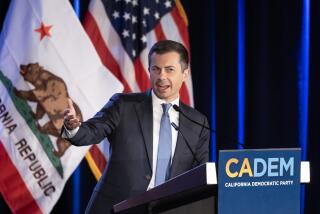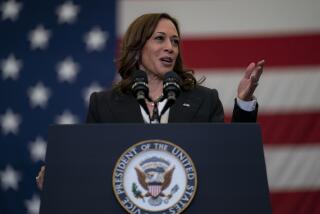Democrats OK Primary in March : Politics: California would gain major clout in the presidential nomination process. The Legislature and governor must approve earlier date.
- Share via
California’s chances of becoming a major, early player in the presidential nominating process improved dramatically Wednesday when a national Democratic Party panel decided to let the state move up its 1992 presidential primary from the traditional June date to the first Tuesday in March.
The state Legislature and the governor must approve advancing the date, and there are indications that they are willing to do so.
If the state’s presidential primary is changed, it could dramatically alter nomination politics, dominated for nearly two decades by the small states of Iowa and New Hampshire, which usually hold their contests in February, and by New York, where the presidential primary is in April.
More recently, the southeastern states have become a more important force by organizing a “Super Tuesday” collection of primaries in March.
The intense national focus on early results has long given Iowa and New Hampshire a clout in the nominating process far out of proportion to their delegate numbers. Critics have also complained that their populations do not reflect the demographics of the country.
New York has also enjoyed enormous clout--in 1984, Walter F. Mondale derailed Gary Hart’s surging Democratic candidacy there and, in 1988, Michael S. Dukakis and Jesse Jackson ended the candidacy of Tennessee Sen. Albert Gore Jr.
Meanwhile, even though California better reflects the country’s demographics and has by far the most delegates, the state has been an afterthought in the nominating process because its June primary comes so late that the nominations are basically locked up by then. In 1988, for example, Democrats Dukakis and Jackson hardly bothered to campaign here. George Bush had wrapped up the GOP nomination on March 8.
“For the last generation everything that has been done in the Democratic Party’s rules game has been designed to make the nominating process a long, drawn-out, bloody battle that divides the party and leaves it unable to position itself for the general election,” said consultant William Carrick, who managed Democratic Rep. Richard Gephardt’s 1988 presidential bid. “If California moves up its primary, it will give the Democratic Party a decisive early battle to stop this nonsense.”
“For the Republicans, it will force them to leave those little all-white states and come to California, which is more diverse and has more mainstream Republicans,” added Carrick, who is managing Democrat Dianne Feinstein’s 1990 bid for governor in California.
One result of an earlier California role would likely be a spotlight on urban issues and immigration, which get no mention in early, small-state contests.
The nominating process itself could be affected in major ways if California moves its primary up to March.
Because it does not cost much to campaign in Iowa and New Hampshire, that has allowed unknown, under-financed candidates to compete. Jimmy Carter won Iowa with a thousand handshakes in 1976 and became an overnight phenomenon as he headed for the White House. Hart, dead broke, still upset Mondale in tiny New Hampshire in 1984 and very nearly took the front runner out of the contest altogether.
If California weighs in as early as March, the presidential candidates will face some tough choices.
Presumably, Iowa and New Hampshire will still go first, since those states so enjoy the economic benefits of the attention that their laws require them to be first in the nominating process. So the news media would still focus on them.
But, if Wednesday’s development in Washington goes forward, awaiting the candidates when they come out of the tiny states will be the monster. Campaigning in California, which will have 30 million people in 1992 spread over seven major media markets, is an enormous, expensive, television-driven endeavor.
The prize, though, would also be enormous.
In 1988, California sent 336 delegates to the Democratic national convention. The party requires a division of them based on how each candidate does in the primary. The California Republican Party sent 175 delegates to its 1988 convention and it was winner take all.
Early primary campaigning activity is likely to be intensified in California in 1992 by new state Democratic Party rules and the state party’s eager chairman, former Gov. Edmund G. Brown Jr. The new rules allow the party to endorse in the presidential primary. And Brown has indicated recently that he will encourage all would-be candidates to come out to the state early and compete for the party’s support.
There is still a ways to go before Wednesday’s decision by the national Democratic Party leads to a new California primary date.
The Democratic National Committee has no legal power to block California from moving its primary date, but Wednesday’s decision sent an important signal to those in the state who want to make the change.
The California Assembly has already passed legislation to make the change, and Senate action could come as early as today. State Senate President Pro Tem David A. Roberti has now dropped his opposition to moving up the primary, according to an aide.
The bill’s backers in Sacramento are confident of passage, said Democratic officials in Washington.
“I think it’s terribly important for a state as crucial as California to have an early impact on the nomination,” said Democratic National Chairman Ron Brown, who led the cheering here for the California shift.
Moreover, Democratic Party leaders anticipate that by having the nation’s largest state weigh in early, the nomination competition would be speeded up. Thus the party’s candidate would have more time to plan his attack on incumbent President Bush.
“Anything that gets the showdown states into the process quicker is better for us because it gets the nominating process over sooner,” said Paul Tully, the party’s national political director.
In reality, though, as party leaders here acknowledged, the results of such a shift are hard to calculate in advance.
“We always have unintended consequences,” cautioned Don Fowler, chairman of the party’s Rules and By-Laws Committee, which reviewed on Wednesday a draft of the new delegate selection rules for 1992. The rules are expected to get final approval from the Democratic National Committee next month in Indianapolis.
After both the state Assembly and Senate work out differences in the bills, it must be signed by Gov. George Deukmejian. Although the governor in 1988 opposed having the early primary, he has since been lobbied by both Republicans and Democrats who would like the state to have a greater impact on the nomination.
The governor has “expressed support for moving up the date of the primary in presidential election years,” said his deputy press secretary, Tom Beerman. “He’d be expected to sign” a bill to move up the primary.
Because Democratic Party rules require that delegates be distributed by proportional representation, it is possible that the California results could be inconclusive since the delegates could be spread among many candidates.
Republican rules permit the winner of the primary to get all the delegates. But with President Bush expected to seek reelection, a nominating contest seems unlikely in the GOP.
The date of the California primary has not been a major issue among Republicans. The Republican National Committee traditionally gives the states a lot of leeway on when they want to hold primaries.
Fowler could foresee other problems after Wednesday’s ruling.
“I anticipate that other states will move up their primaries to compete with California’s,” he said. “If that happens, the support they all get on primary day might be dispersed, so that the nominating process would then be prolonged instead of speeded up.
“This is a mechanical adjustment, the political impact of which is not necessarily cosmic,” Fowler added.
To accommodate the proposed California date change, Fowler’s committee approved a change in the rules to begin the “window,” the alloted time period for most delegate contests, on the first Tuesday in March instead of the second Tuesday.
By placing an expensive California primary so close to the front of the process, just before the sprawl of Super Tuesday, the Democrats will accentuate the importance of money in determining the next President.
But many Democratic analysts point out that an early California primary might only raise the value of Iowa and New Hampshire, not diminish it.
“In a situation where California moves up, it could create one of the most explosive weeks in a nominating calendar,” said Democratic consultant Tom Donilon.
Love reported from Los Angeles and Shogan from Washington. Contributing were Times political writers John Balzar and Ronald Brownstein.
BACKGROUND
California voters have not had much say in picking presidential nominees because the primary election comes so late. The state Legislature is trying to change that for 1992, by moving the primary from June to March. On Tuesday, a Democratic Party rules committee gave the green light for the change. The state Senate is expected to approve the change, possibly this week. After the Assembly and Senate work out differences, the bill will go to Gov. George Deukmejian, who endorsed the concept last year.
More to Read
Get the L.A. Times Politics newsletter
Deeply reported insights into legislation, politics and policy from Sacramento, Washington and beyond. In your inbox twice per week.
You may occasionally receive promotional content from the Los Angeles Times.










